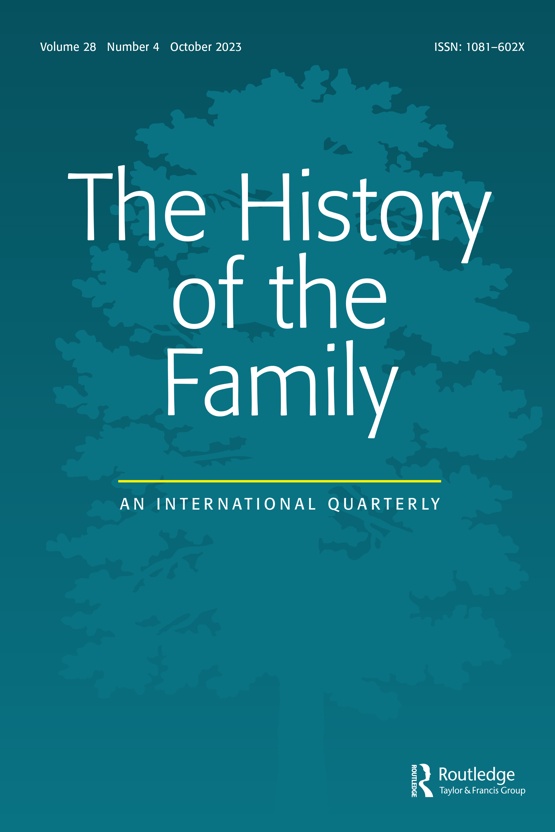Submit a Manuscript to the Journal
The History of the Family
For a Special Issue on
Household, Family, and Community Responses to the Direct Costs of Epidemics
Manuscript deadline
01 July 2024

Special Issue Editor(s)
Dr. Daniel R. Curtis,
Erasmus University Rotterdam
[email protected]
Dr. Bram van Besouw,
Utrecht University
[email protected]
Bram Hilkens,
Erasmus University Rotterdam
[email protected]
Household, Family, and Community Responses to the Direct Costs of Epidemics
The economic impact of epidemic disease in the past is still heavily debated. Some scholars suggest that severe epidemics acted as a vehicle for temporary “egalitarian” redistribution of material wealth within societies, while others emphasize negative impacts such as economic contraction and disruptions to long-distance trade.
In this special issue, we zoom in on the direct economic impact of epidemics experienced at the level of individual households, families, and communities. We are seeking contributions that try to unravel how people have dealt with the economic implications of epidemic-induced mortality at the micro level. Put simply, which groups of people were most affected by epidemics, and why? What were the direct costs and direct opportunities, for whom, and how did these change over time? In the process, we aim to extend our understanding of the economic implications of epidemic disease by delving deeper into different strategies employed within households, families, and communities.
In this special issue, we privilege micro-level economic aspects—and especially the direct costs of experiencing epidemics—and accordingly try to integrate this into a literature that has, so far, mainly focused on the aggregate economic impacts and redistributive outcomes of epidemics. Although the literature has discussed hardships such as the destruction and burning of capital goods; the cessation of production and trade activities; and direct financial costs for households in burials, funerals, “plague cleaners”, the delivery of food and resources, and enforced isolation, we are yet to come to a conclusion on to what extent these offset some of the “positive” aspects often cited—such as greater availability of housing or land, early accessibility to inheritances, or higher real wages.
In our view, a clear understanding of how people dealt with the economic burden of epidemics provides a useful “window” into vulnerabilities and disadvantages within communities that are often obscured from view during “normal times”. These household and communal economic decisions made under epidemic-induced pressures reveal which interests were prioritized—both the material interests and the individuals and groups involved. Hence, the prospective studies in the special issue will not only add detail to existing studies on the aggregate economic impact of epidemics in the past but, importantly, provide essential insights into the decision-making processes that produced these aggregate outcomes.
Potential questions to address may include:
- What did new “epidemic industries” look like such as paid “plague cleaners” or “corpse carriers”, who did these jobs, and how did they shape local economies?
- How did epidemics affect geographical patterns of consumption and market engagement? To what extent did this influence the relationship of households, families, or communities with the market in the long term?
- How did epidemics—with their demographic impact on migration or mortality—affect participation in collective institutions?
- How have epidemics affected household debt, access to credit, and in turn, the capacity to transfer assets or resources?
- How did epidemics change life-cycle accumulation strategies of individual households?
- How did epidemics shape households’ and families’ involvement in the land and lease market?
- Can we use micro-level analysis of epidemics to reveal new kinds of obscured or intersectional inequalities that are hidden behind aggregate statistics?
- How did epidemics impact on the level of importance individuals, families, and communities placed on certain types of assets, resources, or wealth?
- How did pest houses shape local economies, and which segments of society were most affected?
- What were the economic implications of suddenly losing a parent or both parents in an epidemic?
- How did epidemics affect local capacity to collect tax, and how did it shape spending?
We are not prescriptive in our call. All periods of history and all regions of the world are possible. Similarly, we welcome various approaches—qualitative and quantitative—across various fields of economic, social, cultural, and demographic history.
Looking to Publish your Research?
Find out how to publish your research open access with Taylor & Francis Group.
Choose open accessSubmission Instructions
Deadline for proposing abstracts of papers (max 500 words) is September 5, 2023.
By email to: [email protected]
The acceptance of abstracts is announced at the end of September 2023. We invite all authors that have been accepted to present their work at a workshop held at Erasmus University Rotterdam in November or December 2023, with travel and accommodation fully funded by the NWO VIDI project “Positively Shocking!”. The full papers are to be completed and submitted by 1 July 2024 (max 10,000 words), and they are sent out for peer review. The final papers will appear in the journal in the winter of 2024.